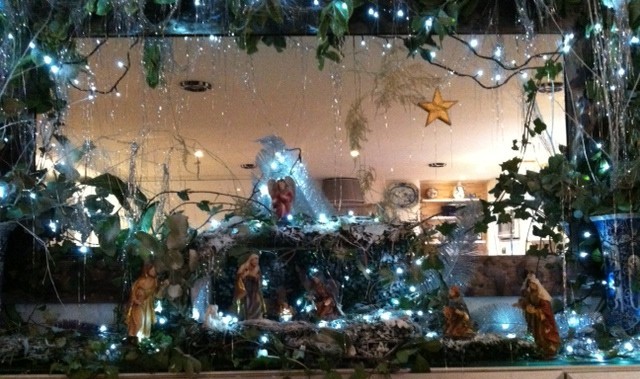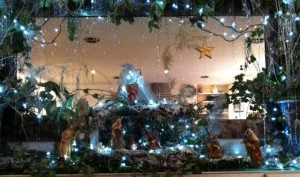Rose Tinted spectacle in a penitential season
From Martinmass to Christmas was in its entirety the same length as Lent. Originally therefore Advent was another 40 day penitential season. Save the Sundays – the Lord’s Day – the other days of the week were days of fast and the Fridays and Christmas Eve were days of fast and abstinence (days when no meat might be eaten). In the ninth century Pope Nicholas I reduced the season to four weeks and substituted full fast and abstinence to a period merely of abstinence. Since 1907 the season has begun in the western Church on the first Sunday nearest the feast of Saint Andrew the Apostle (30th November). Advent therefore runs for a period between 21 and 28 days depending upon when the first Sunday falls. Advent is the first season of the liturgical year. Missals, prayer books and breviaries also therefore commence in Advent. Like Lent it is a penitential season where for example no flowers are used on the altar or in the church; no organ music is played; the Gloria is not said nor sung in the Mass; the priests wear purple vestments (originally black) and deacons and sub deacons wear no dalmatics.
Advent originates before the fourth century but history cannot give it a particular date. We know in the fourth century Synod of Saragossa allusion is made to a penitential period already commonly observed before the celebration of the feast of the Nativity of the Lord (Christmas).
In the reign of Pope Gregory the Great (590-604), the season of Advent is allocated its own ritual prayers. The first Propers are allocated to the masses for the four week season of Advent. These include: the introit; collect; epistle; gradual; gospel;offertory; secret; communion and post communion prayers or readings which are particular only to the services of the day – hence the term proper – as opposed to the ordinary prayers – the kyrie; Gloria; Credo: Sanctus; Benedictus; and Agnus Dei which are prayers ordinarily said in every Sunday Mass. From the middle ages the proper prayers were usually chanted either by the choir or by the priest or other ministers officiating at the service.
This was the simple or plain chant and is given its familiar notation in the missals and pontificals from the reign of Pope Gregory the Great in whose short reign much of the liturgical practice of the early Roman Church was codified. The practice of the Roman church in time became the liturgy (or orders of service, if you prefer) of all the western churches until the Reformation.
The first prayer of every mass is the Introit; and the first word in an Introit often came to be used as a shorthand to refer to a particular mass. The most famous and obvious is Requiem – the term used to cover all the services or masses said for the dead and whose introit opens Requiem aeternam, dona eis Domine ( Rest eternal, grant unto them o Lord). The Introit for the third Sunday of Advent is taken from Philippians 4.v.4-5 Rejoice in the lord always; again I say rejoice. Indeed the lord is near. In Latin this is rendered Gaudete in Domino semper; interum, dico, gaudete. Thus this Sunday is know as Gaudete in the Western Church. It marks a half way point in advent and as a consequence the priests wear Rose coloured (or pink) vestments and flowers may be placed on the altar.
From Gaudete forward – rather like Holy Week – the services for each day are carefully devised, each one becoming more insistent on the near approach of Christ’s birth. The readings include the prophesies of Isaiah the most messianic of the Jewish Prophets. The gospels predominantly are taken from Luke who gives the most complete account of the nativity. These readings include the Magnificat – Mary’s canticle and finally on the morning mass of 24th December – Zechariah’s canticle The Benedictus. These readings and prayers later provided the inspiration for the librettist Charles Jennens – who assembled the libretti for a number of Handel’s oratorios – but perhaps most famously chose the words used in Handel’s Messiah. Part I of Messiah is full of quotes that are used in the church’s services for Advent and Christmas.
The tradition of taking lines from a church prayer to name a particular day continued on in the English services of Thomas Cranmer’s Book of Common Prayer. “Stir-up Sunday” – traditionally the day for making Christmas puddings – takes its name from the Collect of the last Sunday before Advent : Stir up, we beseech thee, O Lord, the wills of thy faithful people; that they, plenteously bringing forth the fruit of good works, may of thee be plenteously rewarded; through Jesus Christ our Lord. Amen.
The Benedictus of Zechariah ; Luke I v.67-79
Blessed be the Lord God of Israel; because he hath visited and wrought the redemption of His people: And hath raised up an horn of salvation to us, in the house of David his servant: As he spoke by the mouth of his holy prophets, who are from the beginning: Salvation from our enemies, and from the hand of all that hate us: To perform mercy to our fathers, and to remember his holy testament, The oath, which he swore to Abraham our father, that he would grant to us, That being delivered from the hand of our enemies, we may serve him without fear, In holiness and justice before him, all our days. And thou, child, shalt be called the prophet of the Highest: for thou shalt go before the face of the Lord to prepare his ways: To give knowledge of salvation to his people, unto the remission of their sins: Through the bowels of the mercy of our God, in which the Orient from on high hath visited us: To enlighten them that sit in darkness, and in the shadow of death: to direct our feet into the way of peace.

